Situation in Ukraine
The LGBTIQ* community in Ukraine is more visible than ever – it’s actually a success story. However, hatred and violence continue to affect lesbians, gays, bi, trans*, inter* and queers (LGBTIQ*) while the political class remains inactive. The government publicly protects community events such as KyivPride, but otherwise does little for the civil and human rights of those affected. And this despite the fact that nationalists are mobilising against sexual minorities more than ever.
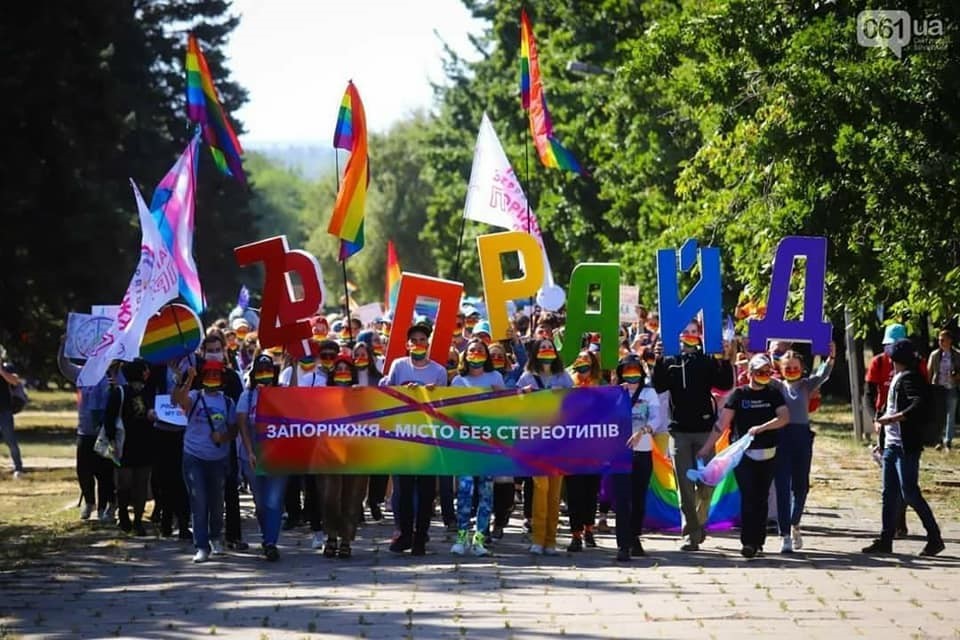
The report published by the Kyiv based Human Rights organisation Nash Mir from 2021 contains exactly 47 pages. It unveils in all details the real situation of lesbians, gays, bi, trans*, inter* and queers in Ukraine: How justice, politics, media, churches and society position themselves, where discrimination and violence have occurred, and of course it reports on the lives of sexual minorities in the occupied territories. The result is quickly summarised: Ukraine’s reform course has stalled in this area and violent ultra-right splinter groups are setting the agenda.
Indeed, organisations such as National Corpus, Pravyj Sector, Tradition and Order, Trysub (Trident), Karpatska Sitsch, Sokil (Falcon), Bratstwo (Brotherhood) etc. are attacking public events and institutions of the LGBTIQ* community more and more often. The presence of local and national media makes such actions attractive for the attackers, as they can better spread their messages to protect “the traditional Ukrainian family” against Western decadence. While right-wing parties are not currently represented in Ukraine’s parliament, the Verkhovna Rada, and have little influence on politics and society, they are nevertheless very present on the streets. And homo- and trans*-phobia has recently become their favourite topic.
Attacks on the street
Around 17 May, there are always incidents directed against events on the International Day Against Homo-, Bi-, Trans*- and Inter*-phobia (IDAHoBIT). All over Ukraine – apart from the Corona years – smaller events such as flash mobs, protests, rallies and discussions traditionally take place. In Zaporizhzhya, during a meeting of the local LGBTIQ* organisation “Gender Z” two years ago, a firecracker was thrown into the crowd of protesters; a police officer was injured. The courts have since convicted the man.
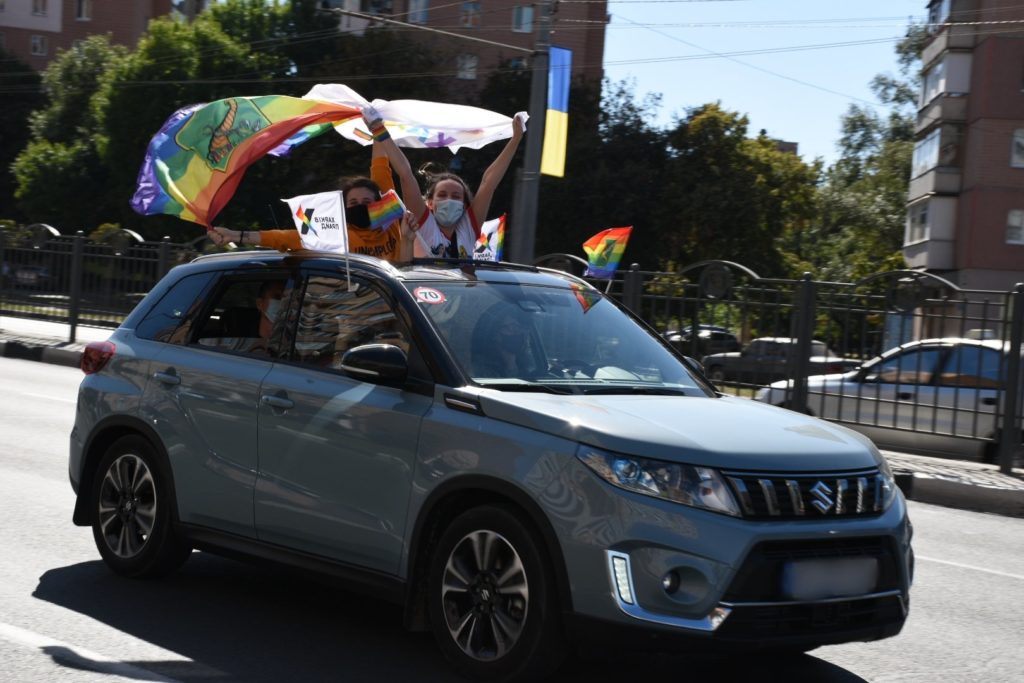
In Chernivtsi, right-wing radicals and believers blocked the Equality Festival two years ago, to which the LGBTIQ* organisation Insight from Kyiv regularly invites people all over Ukraine. At the end of last year, it was the Coming Out Festival held by the NGO Sphere in Kharkiv. The event was cancelled for security reasons, the police evacuated the participants but let the radicals go ahead.
In Kryvyi Rih, nationalists regularly attack the city’s Queer Home, one of several community communication and cultural centres run by the LGBTIQ* organisation Gay Alliance Ukraine. The head of the organisation was severely beaten up. He prefers not to have his name mentioned publicly. “They shouted ‘Sieg Heil’ and ‘Death to the pederasts'”, he says. The police did not catch the perpetrators.
Praying for Godly Order
And even in the pandemic year of 2020, the hateful opponents of a liberal social order did not back down from their agenda. Wherever they could, they were present. At OdesaPride, which took place in August, they brutally roughed up the crowd of demonstrators; the police just watched everything passively for a long time. The Prides in Kharkiv and Zaporizhzhya were peaceful though.
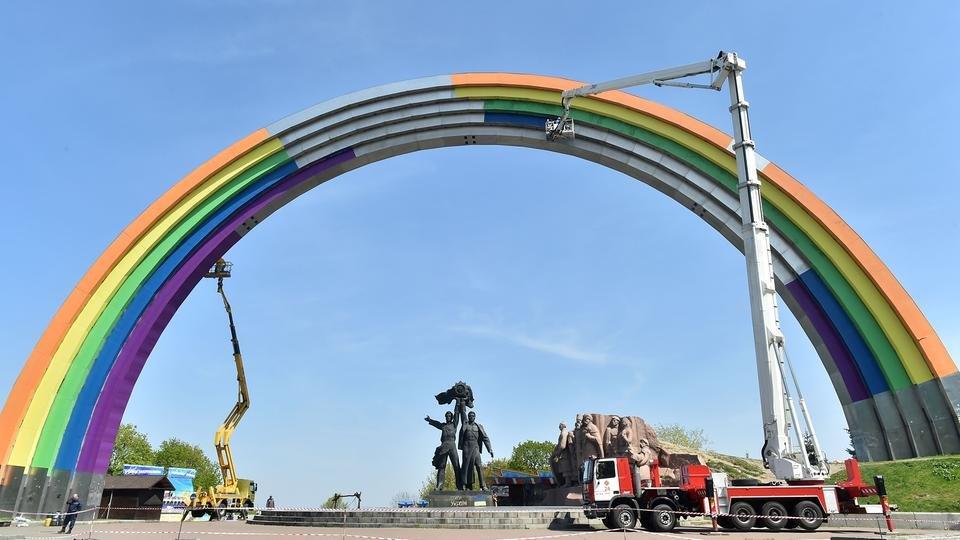
The nationalists often receive support from religious fundamentalists such as the organisation “Love against Homosexualism”. The fundamentalists persistently write homophobic petitions. In terms of content, they are in line with the country’s churches, which now prefer to remain silent when it comes to LGBTIQ* issues. Only Patriarch Filaret, a prominent representative of the Ukrainian Orthodox Church, publicly blamed same-sex marriages for the corona virus. He then contracted it himself.
Most of the submissions are directed against the promotion of “non-traditional families”, i.e. against so-called gay propaganda, supposedly in order to protect minors, and in this respect are reminiscent of the legal situation in Russia. In Russia, there has been a law banning “propaganda of non-traditional sexual relations” since 2013, which has led to a hunt against homosexuals and has resulted in numerous human rights violations to this day.
Violence against minorities
Cities such as Poltava, Ternopil and Ivano-Frankivsk regularly send complaints to the political leadership in the capital, demanding that “gay propaganda” be stopped and discrimination against sexual minorities be written into the law.
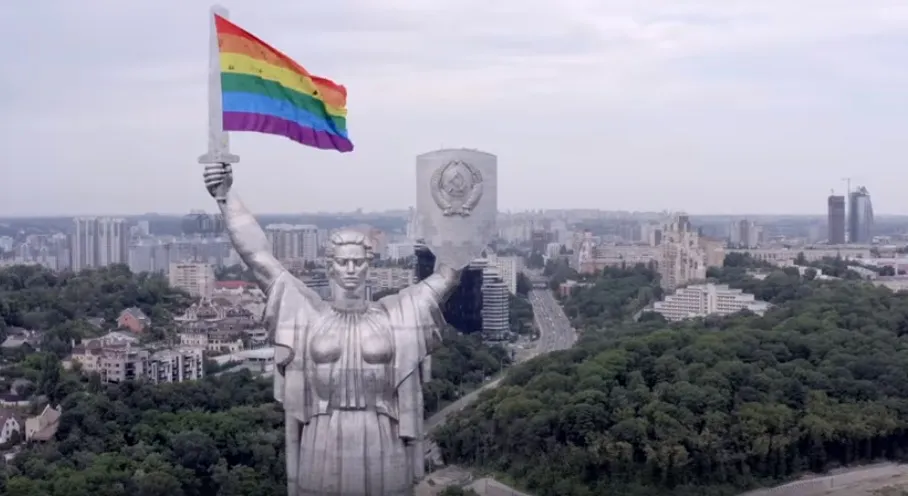
The homo- and trans*-phobia that is fomented in this way repeatedly leads to discrimination and violence. The human rights organisation Nash Mir documents hundreds of cases in its latest report. Lesbians, gays, bisexuals, transgender and intersex people probably experience verbal and physical assaults almost daily, assuming that not all of them actually report what they have experienced. The fear of coming out to the police and the shame of being a victim play a major role here. According to Nash Mir’s report, LGBTIQ* are ridiculed and publicly discredited – at school, at work, while shopping. Groups such as “Modnyi Prygowor” are particularly perfidious in this respect, luring gay men to one of their members’ homes via dating portals, forcing them to come out, sometimes beating and raping them, filming the scenes and posting them on the internet.
While the police in Ukraine officially record hate crimes based on homophobia and trans* phobia, they do so only rarely and usually reluctantly, making it difficult to prosecute such acts. In the eyes of the law, so-called hate crimes are still not considered “particularly serious”, which normally should lead to harsher penalties if convicted. In many cases, the police discriminate against the victims themselves or do not show much interest in successful investigations – although the situation has already improved to some extent through the state-mandated training of many police officers in human rights issues. In the past few years, round tables have repeatedly taken place, in which employees of the Ministry of the Interior and the police have participated alongside human rights activists and LGBTIQ* organisations. The goal: combating hate crime, helping to make public LGBTIQ* events safe and ensuring that sexual minorities are treated respectfully.
Soft opening
In the eyes of Ukrainian civil society, politics – with exceptions, especially at the local level – is not taking a decisive stand against the nationalists in the country. In the eyes of LGBTIQ* activists, the government does not even stick to its own plans. More on this later.
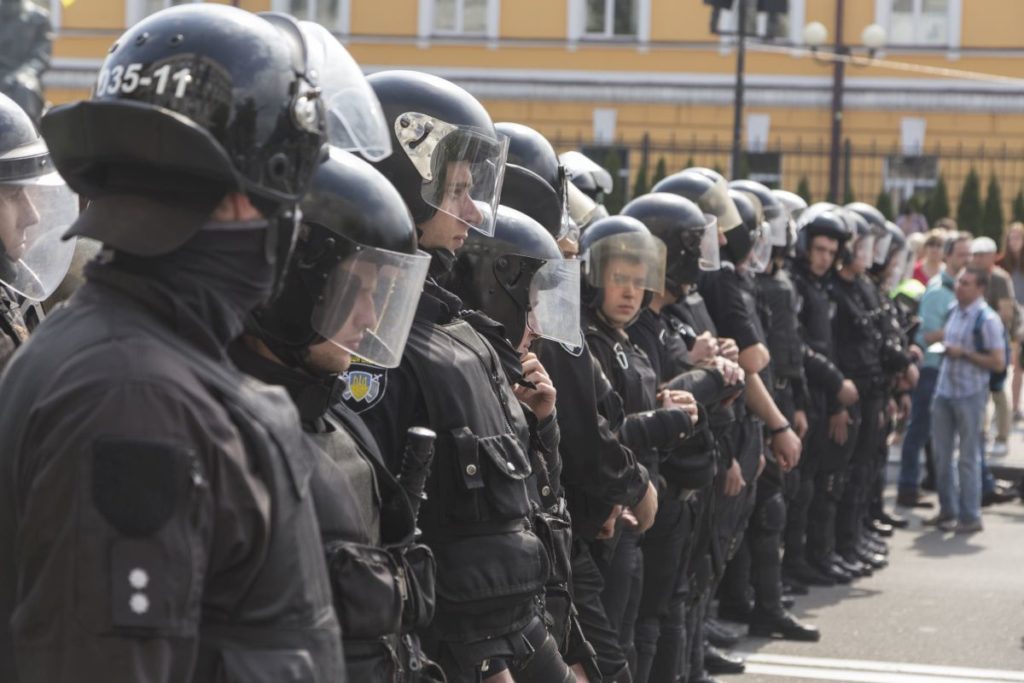
The situation for lesbians, gays, bisexuals, transgender and intersex people in Ukraine is all the more unsatisfactory because the situation has actually improved on a legal level in recent years. Acceptance in parts of the population has also increased.
This is suggested by the most recent study on the topic, “What Ukrainians Know and Think About Human Rights: Assessing Change (2016-2020)”, which was carried out by the Ilko Kucheriv Democratic Initiatives Foundation. Compared to 2016, the proportion of citizens who consider tolerance a fundamental value has increased by 6 percentage points to 31%. Still, 41.8 percent of all respondents would like to see LGBTIQ* rights curbed. In general, more and more people understand that sexual minorities suffer particularly from discrimination (26.3 percent).
Successful Pride movement
“In fact, LGBTIQ* issues no longer arouse particularly strong feelings among the Ukrainian population,” says Andriy Kravchuk, one of the managers of Nash Mir. People are quite willing to talk when it comes to sexual minorities. The country is opening up.
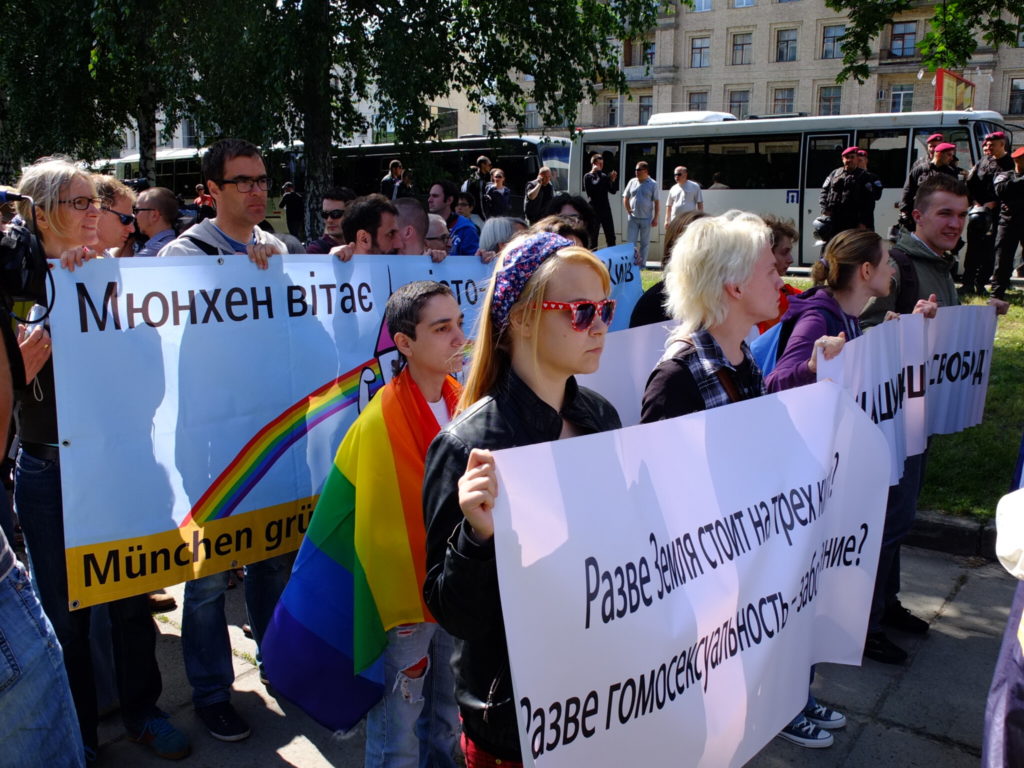
Together with awareness campaigns, the Pride movement is probably primarily responsible for this development. Since 2012, activists from Kyiv, then the Gay Alliance Ukraine and finally the organisation KyivPride together with Amnesty International have tried to hold a Pride every year. At the Pride, lesbians, gays, bi, trans* and inter* – demonstrate every year for equal rights – in memory of the 1969 Stonewall Uprising in New York. It is a mixture of party and politics. In Ukraine, however, political motives are in the foreground.
Supportive society
In 2013, still under President Viktor Yanukovych, a Pride was able to take place in Kyiv for the first time. 150 people demonstrated outside the city under police protection which was provided thanks to the strong participation of foreigners. In 2019, more than 8,000 people marched in the centre of the city (!) in front of the Taras Shevchenko University, and by no means only representatives of the LGBTIQ* community. The guests from abroad made up only a fraction of the participants. Thousands of police officers protected the big event, because radical groups had of course announced their arrival. They threatened with blockades and violence, but in the end the protests remained peaceful. Every year there were injuries after Pride when nationalists went on “safari” through the city – but not in 2019. In 2020, the Pride took place virtually, in line with the rules to fight the Covid 19 pandemic.
KyivPride is quite controversial: a majority of Kyivians (57 per cent) oppose it, according to a survey conducted by the market research institute Active Group in April 2017; 38 per cent are in favour. A few years ago, however, the number of supporters would certainly have been much lower.
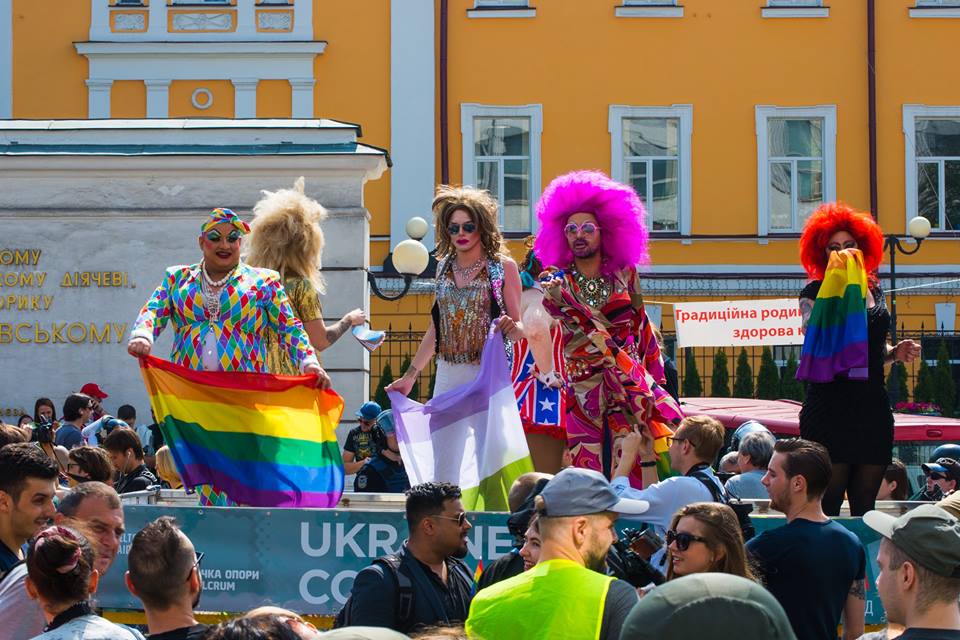
In addition to KyivPride, other LGBTIQ* organisations have started to hold events of their own: LIGA from Mykolaiv, for example, organises the “Days of Equality and Pride” in Mykolaiv, Odesa and Kherson. The LGBTIQ* organisation Insight holds the aforementioned Equality Festival. Gay Alliance Ukraine organises a Pride in Odesa and Kryvvyi Rih, Gender Z in Zaporizhzhya and Sphere holds one in Kharkiv.
Many people support the opening of their country to sexual minorities – especially parents of lesbians, gays and transgender people as well as their friends, but also influential musicians like Iryna Bilyk and Jamala (winner of the Eurovision Song Contest in 2016), artists, bloggers and members of the Parliament. Companies such as the women’s fashion label “Who is it?” and Privat Bank also support the community. In general, Ukraine’s LGBTIQ* community is now well in touch with many areas of politics, society and business.
Human Rights Politics: all well on the outside, no good on the inside
Politicians have an interest in protecting these major events because foreign countries are watching. Ukraine cannot afford to alienate the EU as a partner, too much depends on it economically and politically, especially now. And ultimately, the government’s officially LGBTIQ*-friendly course is also a means of distancing itself from Russia. In the embattled Donbass, the issue is not regulated at all; in Crimea, Russian laws against “gay propaganda” apply. Basically, however, most politicians are indifferent to the issue.
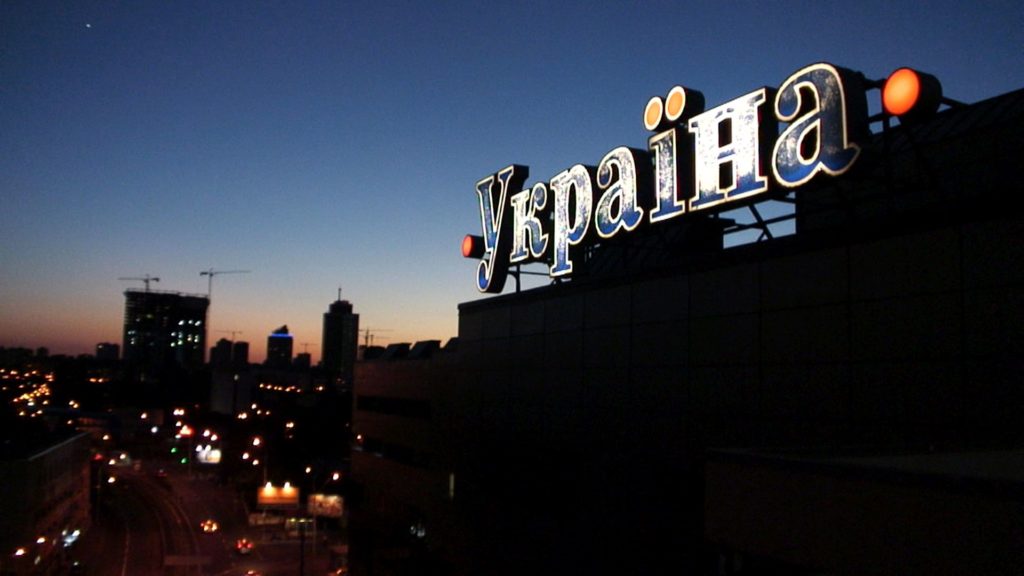
Perhaps this is why the government and parliament show little motivation to implement their own action plan for human rights, which they themselves launched on 23 November 2015. It envisaged comprehensive legislative projects until 2020, including
- protection against discrimination based on sexual orientation / gender identity,
- a registered partnership for same-sex couples,
- new medical standards for transgender people,
- the enshrinement (in the penal code) of hate motives as aggravating circumstances, and
- an abolition of the adoption ban for transgender and HIV-positive people.
The deadlines for the bills have now passed. At least the new government under President Vladimir Zelensky has relaunched the action plan, extended it until 2023 and retained its contents. However, it is more than unlikely that they will be implemented soon.
The future lies in the West
So politicians are waiting on the sidelines while nationalists (and religious people) grow increasingly active and pose a real danger to sexual minorities. Nationalists are much better organised than before, manage to mobilise their – mostly young – supporters quickly and attack when they can. No public LGBTIQ* event is safe from them.
Unsurprisingly, nationalists are also no fans of feminist events and generally of events on topics such as gender justice and equality. Attacks have increased at an alarming rate. They even affect events where the police are involved, such as the aforementioned round tables.
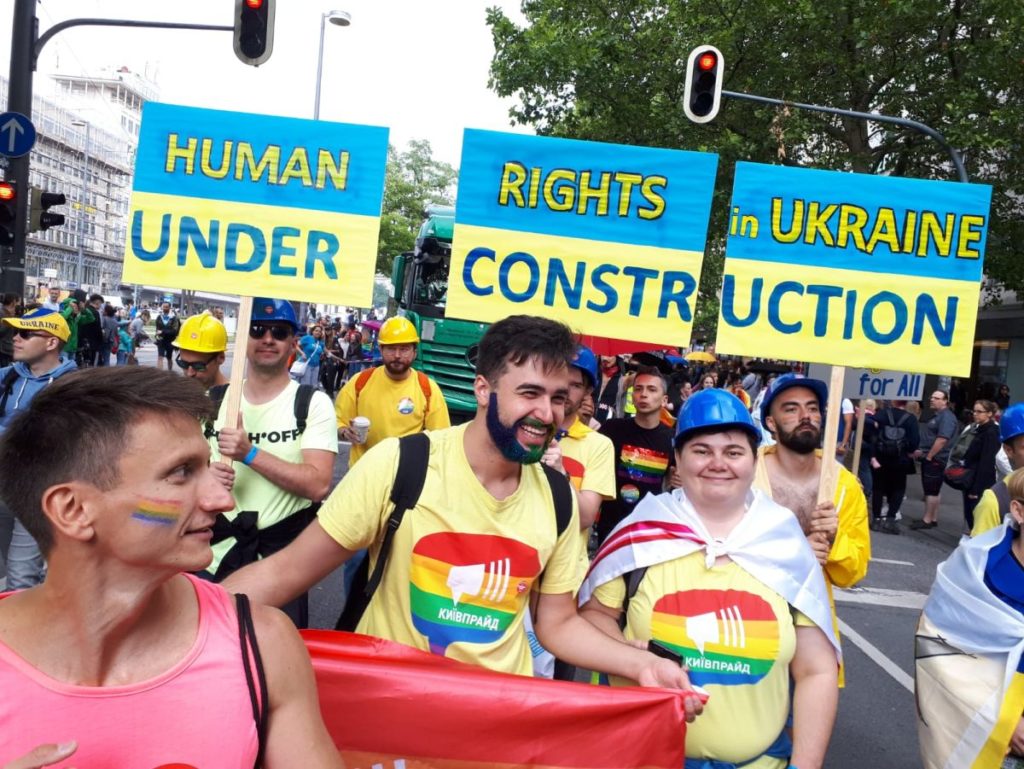
The public does not really take the issue seriously, especially since large parts of the political class do not seem to see a big problem in it. Are nationalists opponents? Allies? Are they trying to destabilise Ukraine?
Some European diplomats suspect that Russia may be partly responsible for the activities – by hiring its own people. However, they do not want to be quoted openly. In any case, human rights activists would like to see Ukrainian politicians distance themselves more clearly from right-wing activities.
Fight for Human Rights
In the long term, however, most LGBTIQ* activists believe that Ukraine’s opening to the West will change the situation of the community and society as a whole for the better. The Russian government, with its homophobic agenda, represents an outdated model that Ukraine cannot emulate, even if the Western part of the world and Russia were to come closer again. The LGBTIQ* community has made a decisive contribution to positive change in Ukrainian society with its fight for human rights. (Status: March 2021)
